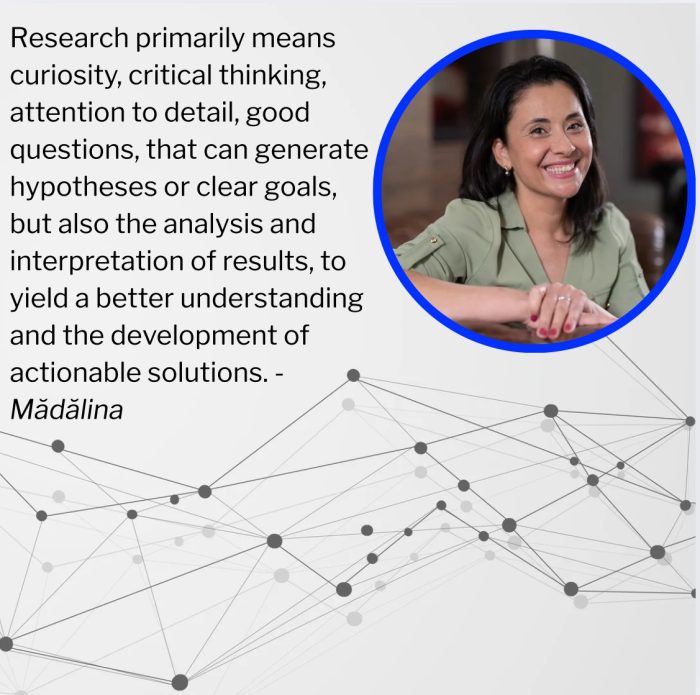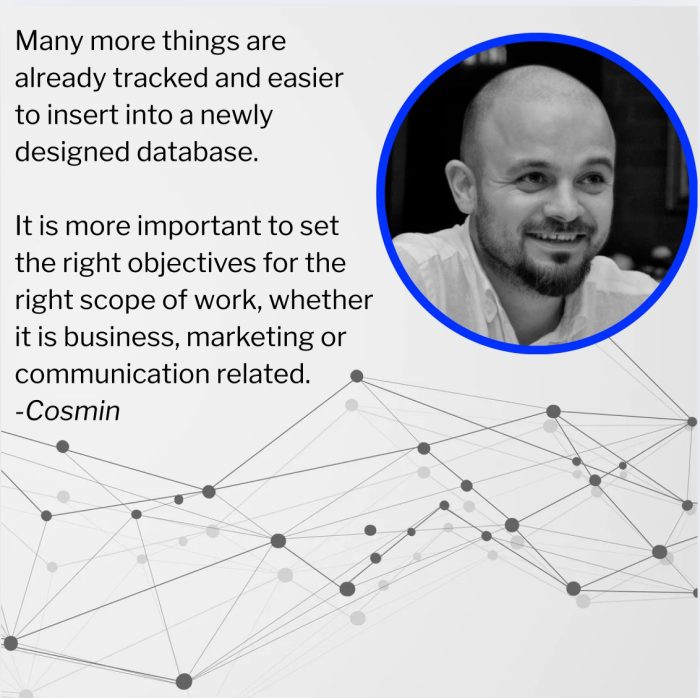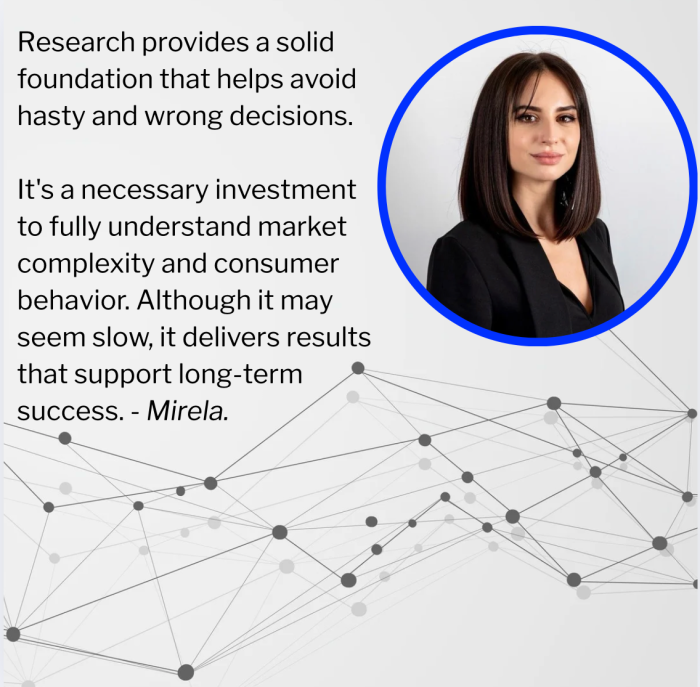In an age where real-time dashboards and infinite metrics dominate our daily routines, does traditional research still hold its ground? According to our professionals – Mădălina Bâdea from Spark Foundry, Cosmin Ciubotaru from Zenith Media, and Mirela Mirică from Starcom – the answer is a firm yes.
Below, we explore their perspectives on why research is more relevant than ever, how it works in today’s fast-paced world, and what misconceptions still get in the way.
What is research, really?
Cosmin sees research as “an intellectual odyssey,” a method for shaping brand narratives from complex societal dynamics: research means finding the answer that you can write down in a very simple and short sentence (the essence) for a given question, about the investigated cohort, audience, group of interest, target, consumer, population segment, prospects, users, buyers, respondents, all of whom are, firstly, people. But it’s hard & challenging! The greatest challenge is to keep it simple, but relevant.
Mirela calls it a “systematic process” that turns raw information into innovative solutions and long-term learning: the goal is to uncover deeper truths and provide innovative solutions. Through research, we can help companies better understand the market and make more informed decisions. Every research project is an opportunity to learn and grow.
Biggest misconception? That data is enough.
All three agree: having data doesn’t mean you have insight.
Cosmin warns that even the most sophisticated data sets are just declarations of perceived reality, not truth: we need to make a step back and always, but always, have a look on the sample or interrogated participants of your study and check the accuracy and quality of collected data before trying to unveil a pattern knowing and keeping in mind that all the answers are just their perceptions and declarations about their own reality.
Mădălina emphasizes that research isn’t just about asking questions, but asking the right ones, to the right people, in the right way: not everyone or anyway can do research. Of course, questions can be asked, but professional research requires a certain rigor, methodology, analysis and interpretation, avoiding errors that may occur. Good research is not just about asking questions, it means asking the right questions, to the relevant people, avoiding influencing the participants, questions asked correctly, starting from a purpose, from some objectives, and interpreting the results with great rigor, correlating them and framing them with the business, cultural or social context.
Mirela cautions that raw data without context often leads to incomplete or even flawed decisions: there’s may be an assumption that raw data is sufficient for decision-making. However, the real value lies in understanding the context of this data. Research provides a complete picture, combining logic with qualitative insights.
When attention is scarce, how can research help us focus on what matters?
Mirela points to the ability of research to uncover deep motivations that surface-level data misses: through qualitative and quantitative methods, research uncovers deep motivations and behavior patterns. It allows for a deeper understanding of values and preferences.
Mădălina says it helps prioritize communication and action based on what truly resonates with people. Given that people’s attention is increasingly fragmented and their time is increasingly limited, research becomes essential to understand what to communicate, when to communicate, how much to communicate, helps to prioritize in such a way as to capture what has real value for people, what attracts them, what motivates them, what really matters to them. Otherwise, there is a risk of investing time and resources in things that are not of interest.
Cosmin distinguishes between what people say and what they do, urging researchers to explore both desires and behaviors: as researchers, but also as humans, we must mitigate between these perceptions and declarations versus actions and facts. While declarations and perceptions provide insight into desires and aspirations, it is the facts and actions that reveal true priorities and behaviors. But we can’t afford to fail to remember that if someone dreams long enough, they might be able to achieve it!
Are marketers asking the right questions today?
There’s concern that the industry is often driven by what’s easy to track, not what’s meaningful.
Mădălina calls for a return to question quality over quantity: not everything measurable is important, and not everything important is easy to measure: a true specialist will always choose the right research, not the easy path to follow, starting from his objectives, from what he needs to understand, not from what or how much he will measure, because the value does not lie in the quantity of measured data, but in the quality of the questions.
Mirela reminds us that likes and clicks are not enough to gauge true relevance or impact: sometimes, complex questions are missed because they require more time and resources. However, crucial issues are those that provide real strategic insights. It’s important to balance easy measuring with questions that bring long-term value.
What about the perception that research is “too slow” or “too theoretical”?
The experts acknowledge that research can feel slow, but that’s not a weakness, it’s a safeguard.
“Cheap and fast won’t be good,” Cosmin reminds us. Trade-offs must be intentional.
Mădălina argues that good research is ultimately about avoiding wrong turns and making decisions that need fewer corrections later: even though research can sometimes seem like a slow or theoretical process, in the end, the most important thing is to choose the right path, to avoid costly mistakes, it’s about making the best decisions, with more clarity.
Mirela adds that research is an investment in quality thinking, not just a step in the process:
In a world of dashboards, why does research still matter, and why is good research valuable?
Each expert puts it slightly differently, but the message is clear: research is indispensable
Cosmin: There is no “because”, good research is valuable!
He underscores the value of reading between the lines, stripping out noise, and interpreting nuance with judgment and empathy: If you breathe harder or remain too relaxed in front of your computer, your smartwatch may be alerting you to an abnormal heart rhythm, an indication of atrial fibrillation (AFib), or another ailment. You search on the internet, ask Alexa/ Siri/ God: “Why me?!?!?!” or your mother about your genetic heritage. You can panic easily, and you get worried and have a real high level of pulse. The key is to judge, probe, analyze, give a sense of context, read between the lines, remove the noise, appreciate the irony and be smart enough to read the truth in lies.
Mirela adds that real insight comes from understanding why and how, not just what and when: Research remains essential in a world filled with real-time data because it provides context and clarity. Good research is valuable because it bridges the gap between data and actionable insights, enabling informed decisions that drive meaningful change. In a world of abundant information, quality research offers clarity and direction. It’s the key to innovation and competitiveness.
“Without research, data is just numbers,” says Mădălina: it puts data into context and turns it into something actionable. Without the right questions and deep understanding, data risks becoming misleading and decisions superficial. Good research sets the framework for smart decision-making: it reveals what truly matters, avoids irrelevant or inefficient solutions, and helps prioritize based on real human motivations. It’s not just about asking questions; it’s about asking the right ones, with rigor, to the right people, in the right way.
Thank you all, and best of luck!
 All Publicis Groupe Romania proprietary data tools in one place.
All Publicis Groupe Romania proprietary data tools in one place.Discover the power of our tools and feel free to get in touch.











